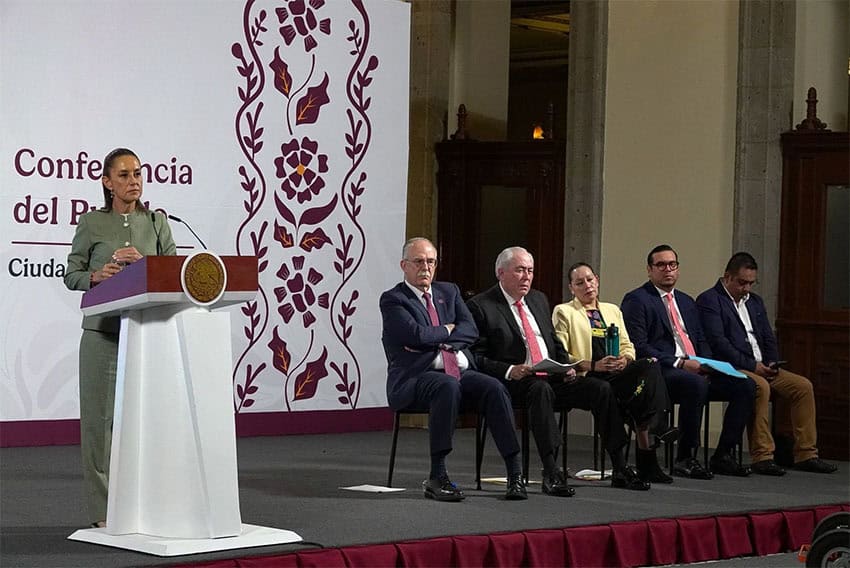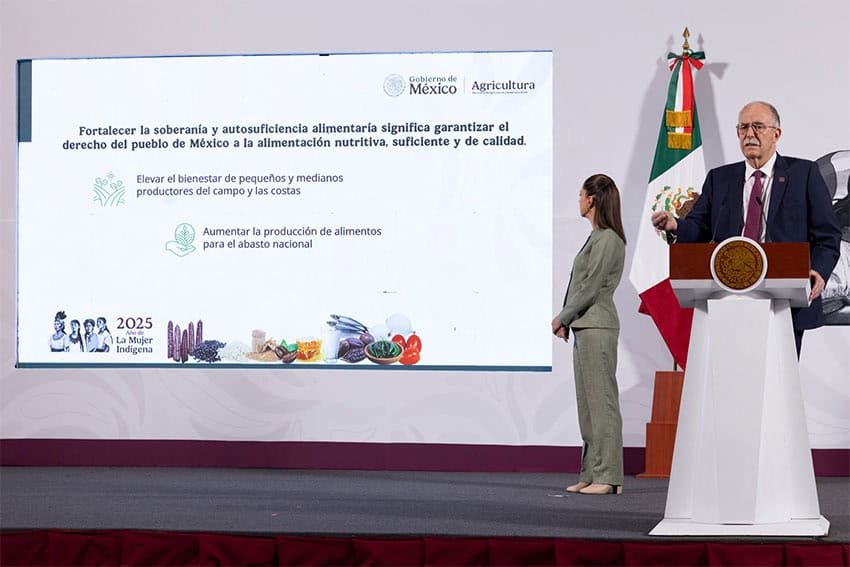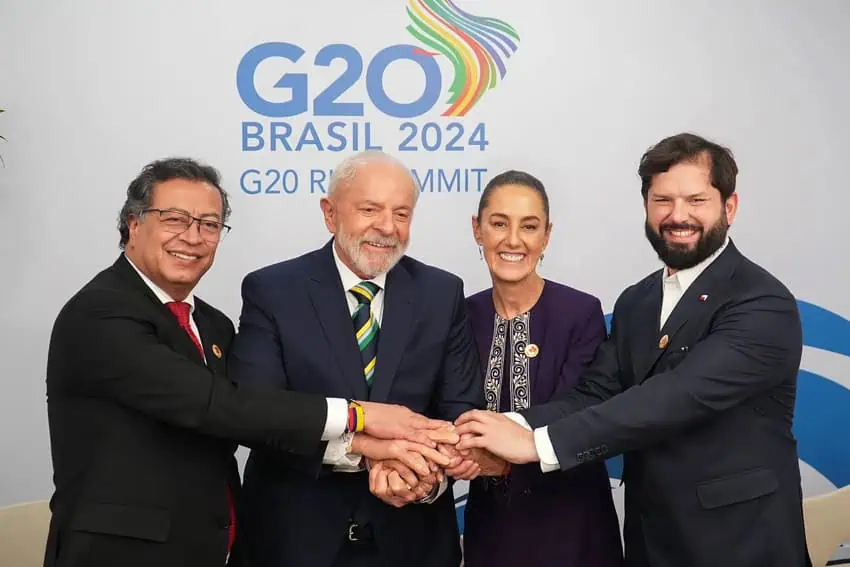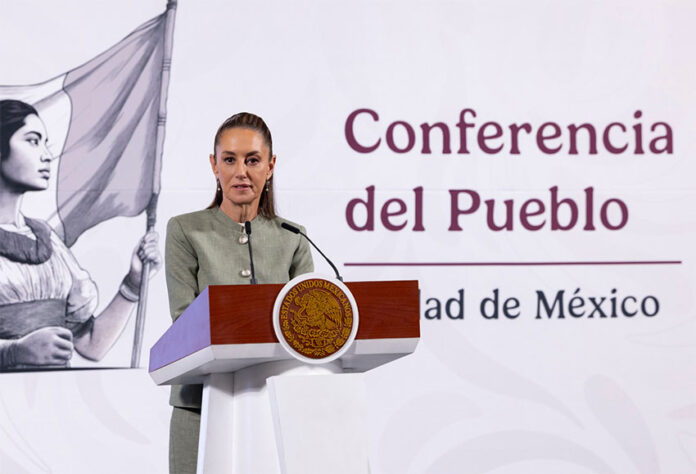Will Mexico benefit from the high “reciprocal tariffs” United States President Donald Trump imposed on imports from scores of countries around the world?
Can Mexico achieve its ambitious food production goals?
President Claudia Sheinbaum addressed the first question at her Friday morning press conference while her agriculture minister considered the second. Sheinbaum also revealed that she will briefly leave the country next week.
Here is a recap of the president’s final mañanera of the week.
On trade with US, Mexico is in ‘a better position’ than other countries
A reporter asked the president whether she believes Mexico will benefit from the high “reciprocal” tariffs the United States has imposed on imports from various countries around the world.
Sheinbaum stressed that she doesn’t want Mexico to benefit at the expense of other countries, but effectively responded in the affirmative.

“We don’t wish ill to anyone, and we want there to be prosperity in the entire world,” she said.
Sheinbaum subsequently noted that Mexico can ship “all products, with the exception of cars, steel and aluminum,” to the United States tariff-free if the products comply with the rules of the USMCA free trade pact.
“Up until now, that is the situation,” she said.
Even if a Mexican product faces the same tariff as the same good shipped to the United States from Asia or Europe — as is the case with steel and aluminum — Mexico has an advantage because “transport costs are lower” due to its proximity to the U.S., Sheinbaum said.
“What other advantage do we have? Many products that aren’t within the steel, aluminum and automotive [categories] continue to have zero tariffs if exported under the United States-Mexico-Canada Agreement,” she said
“Companies that want to invest in Mexico [to sell their products] in the domestic market …and to export, have this [beneficial] characteristic,” Sheinbaum said.
“… So in that sense we’re in a better position than other countries in the world, at least at the moment,” she said.
Mexico food security targets are ‘ambitious’ but achievable, says agriculture minister
Agriculture and Rural Development Minister Julio Berdegué addressed Sheinbaum’s Friday morning press conference a day after the president announced 18 “programs and actions” related to the Plan México economic initiative, including one aimed at increasing food sovereignty and self-sufficiency.
He said that the domestic production targets for corn, beans, milk and rice that Sheinbaum outlined on Thursday are “ambitious, but possible to achieve because we’re going to do things well.”

The goals — as cited by the president on Thursday — are as follows:
- Increase annual production of corn to 25 million tonnes by 2030, a 17% increase over current levels.
- Increase annual production of beans to 1.2 million tonnes by 2030, a 64% increase over current levels.
- Increase annual production of rice to 450,000 tonnes by 2030, a 103% increase over current levels.
- Increase annual production of milk to 15 billion liters by 2030, a 15% increase over current levels.
Berdegué said that the government has “various programs” to support the achievement of the targets.
Through the programs, including the new Coseschando Soberanía (Harvesting Sovereignty) scheme, farmers will receive a range of government support, including the provision of high-quality seeds and fertilizers, access to loans and assistance to use new agricultural technologies.
Berdegué said that the government will spend almost 54 billion pesos (US $2.64 billion) this year on the different programs that support progress toward the attainment of the 2030 food production targets.
Sheinbaum to go to CELAC summit in Honduras … but only for 2 hours
Sheinbaum confirmed she would attend the summit of the Community of Latin American and Caribbean States (CELAC) in Tegucigalpa, Honduras, next Wednesday.
It will be her second international trip since taking office in October. Her first was to Brazil for the G20 Leaders’ Summit in Rio de Janeiro in November. She flew commercial to Rio via Panama — and in economy class, no less.
Sheinbaum told reporters that she will only spend a short time in Honduras, where her fellow leftist leader, President Xiomara Castro, has been in office since early 2022.
“I won’t be able to stay the whole time. We’re looking at the schedule to see if I can make it to the inauguration on April 9,” she said.

Sheinbaum said she would be in Tegucigalpa, the capital of Honduras, for “around two hours or something like that” in order to be with “Presidenta Xiomara and President Petro [of Colombia] who is assuming the president of CELAC, and other presidentes and presidentas of Latin America and the Caribbean.”
She indicated that Castro convinced her to attend the summit, describing the Honduran president as “very persuasive.”
“As you know we have a lot of work here, but we’re going to go for two hours, more or less,” Sheinbaum said.
She said she wouldn’t take a commercial flight due to time constraints.
“In fact, to Tegucigalpa there are only flights with stopovers so we wouldn’t have the time. So we’re going to go in a Ministry of National Defense plane,” the president said.
Unlike many heads of state, Sheinbaum doesn’t have a presidential plane at her disposal.
Former president Andrés Manuel López Obrador sold Mexico’s presidential jet — which he never used — to the government of Tajikistan in 2023.
By Mexico News Daily chief staff writer Peter Davies (peter.davies@mexiconewsdaily.com)
